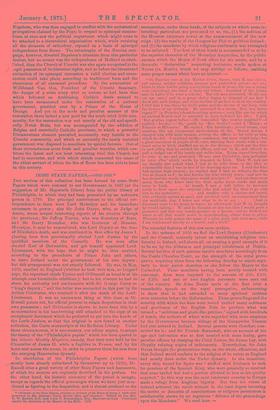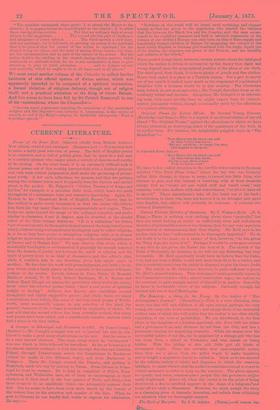IRISH STATE PAPERS,-1603-1606.*
THE nucleus of this collection has been formed by some State Papers which were restored to our Government in 1867 (at the suggestion of Mr. Hepworth Dixon) from the public library of
Philadelphia, to which they had been presented by an unknown person in 1799. The principal contributors to the official cor- respondence in them were Lord Mountjoy and his immediate successors in power ; also Sir John Davys, who, as Judge of Assize, wrote several interesting reports of his circuits through the provinces; Sir Jeffrey Fenton, who was Secretary of State, and Sir Henry Brounker, who was Governor of Munster.
Mountjoy, it may be remembered, was Lord Deputy at the time of Elizabeth's death, and was continued in that office by James I. (having been first provisionally elected Lord Justice by the qualified members of the Council). He was soon after created Earl of Devonshire, and got himself appointed Lord- Lieutenant, with the hope that he might be thus enabled, according to the precedents of Prince John and others, to leave Ireland under the government of his own deputy ; but this arrangement was not exactly followed. He was, in May, 1603, recalled to England (whither he took with him, as Lingard says, the repentant chiefs Tyrone and O'Donnell as heralds of his triumph over formidable rebellions); but in his absence he had to share his authority and emoluments with Sir George Carey as " king's deputy ; " and the latter was succeeded in this post by Sir Arthur Chichester, who retained it after the death of the Lord- Lieutenant. It was no uncommon thing at this time, as Dr.
Russell points out, for official persons to retain despatches in their own possession ; and Chichester is shown to have done this by a memorandum in his handwriting still attached to the copy of an exceptional document which he preferred to put into the hands of the Lords Justices, so that the original is now found in another collection, the Carte manuscripts of the Bodleian Library. Under these circumstances, it is unnecessary, our editor argues, to accept the theory of the "Philadelphia papers" which has been quoted in the Atlantic Monthly Magazine, namely, that they were held by the Chancellor of James II. while a fugitive in France, and by his heirs sent across the ocean, in order to preserve them for ever from the usurping Hanoverian dynasty.
In elucidation of the Philadelphia Papers (which have mostly been already calendared by themselves up to 1609), Dr.
Russell cites a great variety of other State Papers and documents, of which the sources are copiously described in his preface. On
the other hand, his historic summary of the period is meagre, except as regards the official personages whom we have just men- tioned as figuring in the despatches, and is almost confined to the • Calendar of The State Papers, relating to Ireland, of the Reign of James I., 1603-1606, preserved Oa Her Majesty's Public Retard Ojfice, and elsewhere. Edited by the Rev. 0. W. Russell, D.D., and John P. Prendergast, Esq., Barrister-at-Law. Published ur.der the direction of the Master of the Rolls. 1872.
enumeration, under three heads, of the subjects on which some in- teresting particulars are presented to us, viz., (1) the sedition of the Munster corporate towns at the commencement of the new reign ; (2) the results of the Gunpowder Plot to guiltless Ireland ; and (3) the mandates by which religious conformity was attempted to be enforced. Tee first of these heads is recommended to us by the superior character of the Mountjoy despatches, by the politic excuses which the Mayor of Cork offers for his errors, and by a dramatic " declaration " respecting traitorous words spoken at Navan (in Meath), which we may abridge as follows, omitting some proper names which have no interest :—
" On Tuesday was at the Market Cross, Navan, with E. and others, and among sundry seditious persons and pretended priests saw two friars in their habits going openly from house to house, the one a young strip (stripling), the other a lusty old fellow. Inquired of the young man in Latin if he were a scholar. The old man answered, 'Si ille non est, ego sum ;' and in a great choler began to demand of me how I durst ask such things; and what the like of me had to do in the country. I told him I was there by God's grace and the favour of my king, with the licence of my ordinary. He answered in a storm, 'Rex, rex, habes regem ?" (a Piiscian's-head-breaking sentence, very like one for which an ancient Scotch earl is recorded to have forfeited his life). I said, 'Deo gratias, regem habeo.'—He demanded 'Quo nomine appellat ?'—I replied, ‘Jacobo.'—' Oh,' qnoth ho, Rex Scotias !'—and Etiam ; et Francis) et Hibernias.' He replied, 'Est heretiens ; pereat tecnm, cum omnibus ills qui receperunt anctoritatem ab jib. Moved hereat, I charged him with high treason, witting the officer to lay hold on him, which he did. I required further assistance, but none would help; but a great concourse of people of all sorts, uttering their words with a con- fused noise in Irish, shuffled me up in the throng ; which put the friar in such jollity that he reviled the officer, and ran to E., and offered to pull a cudgel out of his hands and strike him. Being stayed from that, he came to me, and protested, 'Hi non snnt Christiani, quia patiuntur to inter ilios,' which words he repeated in Irish. Then W. took me up sharply, and asked what I had to do with friars or the like,' so vehemently that I was in fear of his drawing upon me. I said the friar had spoken high treason ; he replied that I had no witness, the friar was as honest as I; he had known the friar twenty years, 'and now he has denied the words, what more would you have ? ' And yet there were many there who knew that the friar spoke those words and much more in Irish At length I saw a tall fellow in trowsers ready to draw upon the serjeant (who had asked the friar to go with him to the portreeve) and another with a skeane and sword, who evidently meant no good, and received such encouragement from the multitude that I knew not what to do or say. . . . . . (And so deponent went to his home in tears ; he afterwards told W. he thought he would inform.) W. said he thought no less but that I would grow a promoter, and that was cousin-german to a knave ; and he wished his curse on all that would assist in apprehending either friar or priest. Whereby he hath gotten the name of a wise, good, and stout man, while I am condemned utterly as a heretic and a devil."
The essential features of this row seem modern.
In the autumn of 1605 we find the Lord Deputy (Chichester) and the Council, zealously intent on establishing religious con- formity in Ireland, and above all, on causing a good example of it to be set by the Aldermen and principal inhabitants of Dublin. Several batches of such persons receive mandates accordingly from the Castle Chamber_Court, on the strength of the royal prero- gative, requiring them from the following Sunday to repair regu- larly to their parish churches, or else follow the Mayor to the Cathedral. These mandates having been mostly treated with
contempt, fines were imposed to the amount of £50, £100, or £1,00, and one or two English recusants were sent out of the country. Sir John Davys made at the first trial a remarkable speech on the royal prerogative, endeavouring
to show that it had extended to many spiritual matters even centuries before the Reformation. These proceeiings and the severity with which the fines were levied incited many noblemen and gentlemen of the English Pale to produce what was termed a "seditious and giant-like petition," signed with hundreds of hands, the authors of which were regarded with more suspicion by the Government because tidings of the Gunpowder Treason had just arrived in Ireland. Several persons were therefore com- mitted for it ; and Sir Patrick Barnewall, who on account of his age and infirmities was at first treated with some lenity, gave peculiar offence by charging the Chief Justice, Sir James Ley, with illegally refusing copies of indictments. Nevertheless, Sir John Davys thought the prosecutions were, on the whole, efficacious, and that Ireland would conform to the religion of its rulers as England had mostly done under the Tudor dynasty. In the meantime, every ship bound for Spain was "stuffed with Irishmen to seek for pensions of the Spanish King, who were generally so received that none landed but had a portion allotted to him as his quality required." In this way was the most intolerant country in Europe
made a refuge from Anglican bigotry. But that the rulers of Ireland achieved the result without in the least degree incurring
the merits or demerits of conscientious or religious persecutors is satisfactorily shown by an ingenious "defence of the proceedings upon the Mandates." We read here:—
"The mandate containeth three parts; 1, to attend the Mayor to the church ; 2, to appear before the Lord Deputy in the church; 3, to abide there during divine service The first an ordinary duty of every citizen to the magistrate The second also the part of obedience and allegiance of every subject. The third merely a civil duty, and not spiritual ; for it behovetla, in proving an action to be spiritual, that it be proved that the nature of the action be spiritual ; for the church being the place, and the hour of saying divine service the time. are but circumstances, and no part of the nature of the action. But the action itself is the abiding in the church during divine service, which containeth no spiritual action, for he is not commanded to hear or give attention, to pray or yield adoration. . . . . . only to behave soberly and modestly, which he ought to do at all times and in all places."
We must await another volume of the Calendar to collect further incidents of this official system of divine service, which was apparently intended to be composed of a spiritual inattention, a formal violation of religions delicacy, though not of religion itself, and a practical adoration of the King of Great Britain. And this seems to have been felt by Sir Patrick Bavnewall in one of his examinations, where the Chancellor— "Among many arguments touching the soundness of the established religion and His Majesty's zeal towards it, happening, in the course of speech, to call it the King's religion, he forthwith interposed, That is a profane speech.'"











































 Previous page
Previous page